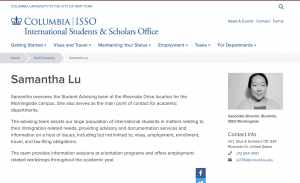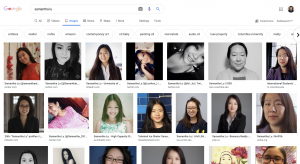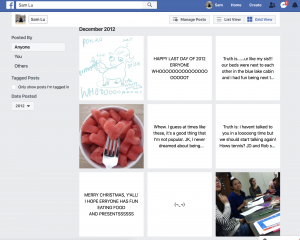Tianshuo Yan
This is a template/ ICT constructed a brand-new world for people, everyone could have his own data identity in the infosphere. This allows us to let people see whatever we want them to see, which is part of the reason why our online identity is different from who we really are. On one hand, infosphere is nothing but another biosphere. To illustrate, running an online image is similar to what people do in everyday life. Every post to the internet is like choosing clothes to show up in the work space. People have to pay attention to what their messages along with the posts, just the same as choosing a good sentence to communicate with others. On the other hand, our life in the real world can be fully controlled by ourselves, whereas the information that shows up in the internet could also be limited by those who construct the platform for people.
Contents
Search Engines
Baidu
Baidu is a search engine that is most frequently used by Chinese people. After searching my name in Chinese, "鄢天烁", several hits showed up, mainly about competitions. The main theme of my childhood life is study. I spent most of my time up until high school studying math, piano, Calligraphy and pretty much anything that my parents think could make me versatile. With plenty of skills, it is not strange that I have attended a lot competitions like Olympics’ Math Competition, Olympics’ Chemistry Competition and etc. The competition organizers are willing to announce the results for fairness. This part of information is accurate, while they could hardly tell a story about who I am. This strongly supports my idea of online identities not equaling self-identities.
While I search for "Tianshuo Yan" in Google, the first term is the first blog I wrote at medium.com, which is the first assignment of SI410. Along with the second blog, they are the whole things about me I could get access to in google.
=Some thoughts about the different presentation of two engines
Although as Floridi wrote, ICTs reduce the friction of information exchanges, there seems a extremely strong friction between China and the western countries.
Social Media Use
Past Usage
The bulk of my social media journey started in my freshman year of middle school, when I first created my QQ account way back in 2012. QQ is Chinese version of What's Up app with some twitter functions like posting your life. Everyone would have those years, posting meaningless sentenses, pretending to know the truth of the world, whereas these posts only make sense in their own mind. I was at this age when I started using QQ. I checked the posts history, the first post was like "I am the selected one". The most interesting part is not the content itself, but what I have done to it after I "graduated" from that period. I set the post to be private so that others can not see it. Like what I stated at the beginning, people in the infosphere have the right to set their own identity. My high school friends never know that I had such "silly" period and oddly aggressive declarations, hence this part of information about my real identity is lost, which contributes to the difference between the infosphere and real world.
Graduated from that "silly" period did not mean that I became normal in the common sense. When I was in high school, the teachers asked us to read news. Sometimes I would have a chance to know about the drawbacks of the Chinese Communist Party (CCP), I had a sort of shameless confidence that I am the only person who knows these points. With the willingness of showing up, I post these points to QQ. These posts did not have comments from others usually. Even the meaningless sentences I posted before had someone click "likes" whereas this is abnormal to have no comments. The delivering of information meets hurdles this time. These hurdles were caused by the algorithm of tech companies like Tencent. QQ is a tech product of Tencent. Usually, a giant company like Tencent is regulated by the country. As the leading party of China, CCP ought to stop the unreliable comments including what I posted before from being delivered to keep the country together. This leads to the lack of anti-CCP part of my information in others’ cognition. Though I am glad my comments were not shown to others, this was not pleasant for 16-year-old Yan. Shortly speaking, some organizations set information barriers so that the information in the public infosphere is exhibited in the way they wanted.
Present Usage
I haven't used QQ anymore since I came to collage. Instead, I became a user of Wechat, which is another Tencent product. Wechat basically has the same functions with QQ with much cleaner interface and more concentrated on the online communication system. I haven’t made a Facebook status in years. In fact, in recent months, I’ve deactivated or deleted a majority of my accounts, including my Instagram and Snapchat. I’ve thought a lot about how I spend my time, especially as graduation looms nearer and I’m forced to consider what post-graduation me will do with her time when she’s not working. One major reason was that the digital version of myself has little to no impact on my real-life self — the way I conceptualize it, digital me is merely a way to distract from the day to day. Time spent on Instagram’s endless scroll is just time I could have spent reading or doing something else that has more measurable returns than a time suck.
Quitting most social media has made me reevaluate who I spend my time with and why. If our only interaction was to send stone-faced selfies to one another on Snapchat, abandoning that platform altogether means that I no longer interact with that person, period. But if selfies were the only communication between us, was that acquaintanceship really anything meaningful? More specifically, if the only version of me someone interacts with is surface-level digital me, then where does real-life me come in?
Philosophy Behind Use Change
If I had to further explain why I started closing down my digital self, I'd probably say something more along the lines of what philosopher Luciano Floridi suggests about human self-understanding. He frames the past three revolutions as ultimately centered on human perception and argues that we're in the midst of a fourth revolution that actually emphasizes how informational human identities are (Floridi 96). Floridi also suggests that the current generation is possibly the last to experience a clear distinction between offline and online states.
I think that's the biggest driver for my departure from social media. In past years, I've noticed that the rush of happiness from offline experiences is beginning to pale next to the excitement I derive from an abundance of likes on an Instagram photo or the number of views on a Snapchat story. I struggle to immerse myself in books the way that I used to. There just isn't enough time is what I tell myself. At first, it was extremely difficult to pull myself out of the attention-seeking mindset I'd so deeply fallen into (I had a 900-day Snapchat streak! There are extracurricular events on Facebook that I can't miss!), but I found that once I deleted or deactivated those platforms, I soon forgot about them. Without repeatedly fueling my obsession with my digital self, I began to prioritize my offline self a bit more, and in the process, I have found that I understand a bit more about who I am, how I operate, and my relation to the world around me (as per Floridi's argument). I spend more time journalling, thinking about what kind of future I want for myself, and even recognizing that value close personal friendships more than surface-level acquaintanceships.
Maybe it's futile. Digital technology is undeniably woven into my life, and I spend most of my waking moments interacting with it, whether that is checking my email, doing my homework, or listening to music, so I'm not truly offline after all. I guess it doesn't matter to me in the end, because (for me at least) it's no longer possible to go offline and still fully engage with the world — I know I'd be missing out on a lot of information, knowledge, and connection. I've accepted that staying logged in is the price I have to pay to interact with other people and information entities the way that I want to.
Looking Forward
Someone who had full access to my digital footprint would be able to precisely follow my use habits over the past eight years as I began to show less and less of myself in the virtual world. If your only concept of me was virtual, you wouldn’t have a very accurate or authentic picture of who I am, and I prefer it that way. Even if someone managed to find one of my defunct social media accounts, I probably wouldn't care very much — there's nothing incriminating out there about me, at least that I know of. Digital me has yet to impede real-life me!
The data broker couldn’t find any useful or accurate information, which I’ll take to mean that my attempts to stay under the radar have worked pretty well so far. It’s always easier to reveal more about yourself as time goes on than it is to reveal too much and delete what’s saved online about you.
References
“Self-Understanding.” The Fourth Revolution: How the Infosphere Is Reshaping Human Reality, by Luciano Floridi, Oxford University Press, 2014.


